Five Terriers Running for a Cause
Five Terriers Running for a Cause
Members of the BU community will run the 126th Boston Marathon for charity
The last two Boston Marathons were upended thanks to COVID-19, but Monday’s race—the 126th—is finally back on track. Runners must qualify for the Marathon based on time or by fundraising at least $5,000 for a charity.
Boston University, as usual, will be well-represented amid the 30,000 expected participants at the starting line in Hopkinton, Mass. Here are the stories of five Terriers running for charity: an alumna, two employees (one is also a grad student), an undergrad student, and a postgrad in Sargent College’s Neurologic Physical Therapy Residency Program.
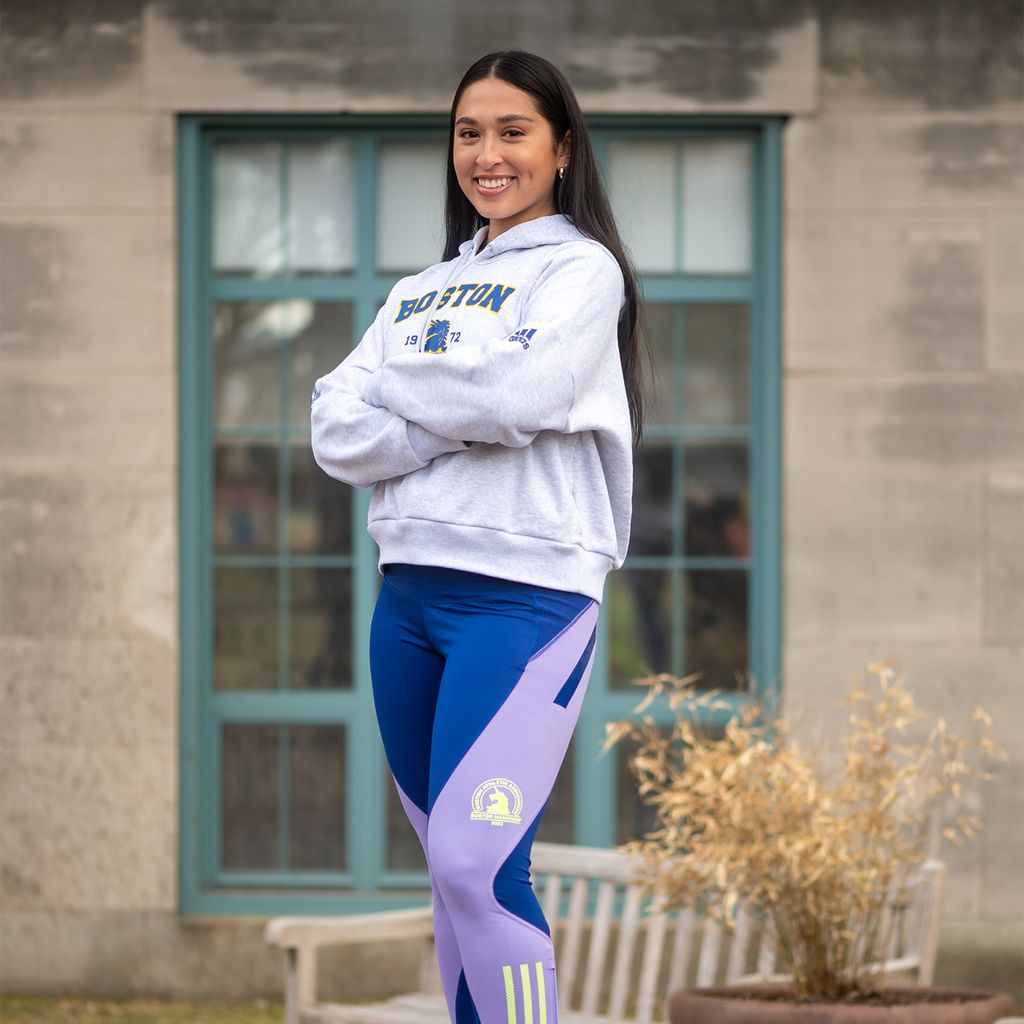
Yesenia Arango (COM’19, Wheelock’21)
A math teacher at a bilingual school in East Boston, Yesenia Arango will run her first marathon on her 25th birthday.
“I plan on finishing strong, and then having my family and friends over to my house for a barbecue and cake if the weather is nice,” Arango says. “But I definitely want to be near my bed by the end of those 26 miles.”
Arango raised money for Metro Housing|Boston, which strives to guarantee housing equity for everyone in Boston. The group provides rental assistance and affordable housing options and holds educational workshops.
“I teach in a community that is changing,” Arango says. “In the [East Boston] area, we see all these new high-rise buildings and expensive luxury condos [being built], and that is displacing a lot of our families, a lot of the families of students I work with each and every day. Metro Housing|Boston helps make sure that those families and our neighbors can stay in their communities.”
Boston’s rent prices are at an all-time high, the Boston Globe reports, and Arango says her family and friends have benefited from Metro Housing|Boston’s rental assistance programs. The fact that she saw the charity’s programs in action helped her choose this cause.
As a Boston-area native who ran track in high school and went on to BU, Arango has dreamed about running the Marathon for years. She fell in love with distance running along the Charles River as an undergraduate. She had late classes, so she would run from Sleeper Hall to the Esplanade in the morning, eventually reaching double-digit miles.
Arango also practices martial arts, holding a first-degree black belt in the combined martial art Gotan Ryu. An instructor who also works for Metro Housing|Boston mentioned that the organization had extra bibs for the marathon, so she applied.
Arango is the first among her family and friends to run the Boston Marathon. While she says it “feels incredible to open up this pathway for [my] friends and family members and the little Hispanic girls who want to see runners who look like them,” she has not had a mentor while training. “I had to do a lot of research on my own,” Arango says. “But I think all of that made me stronger, and I’ve learned so much and I’m excited to pass it on.”
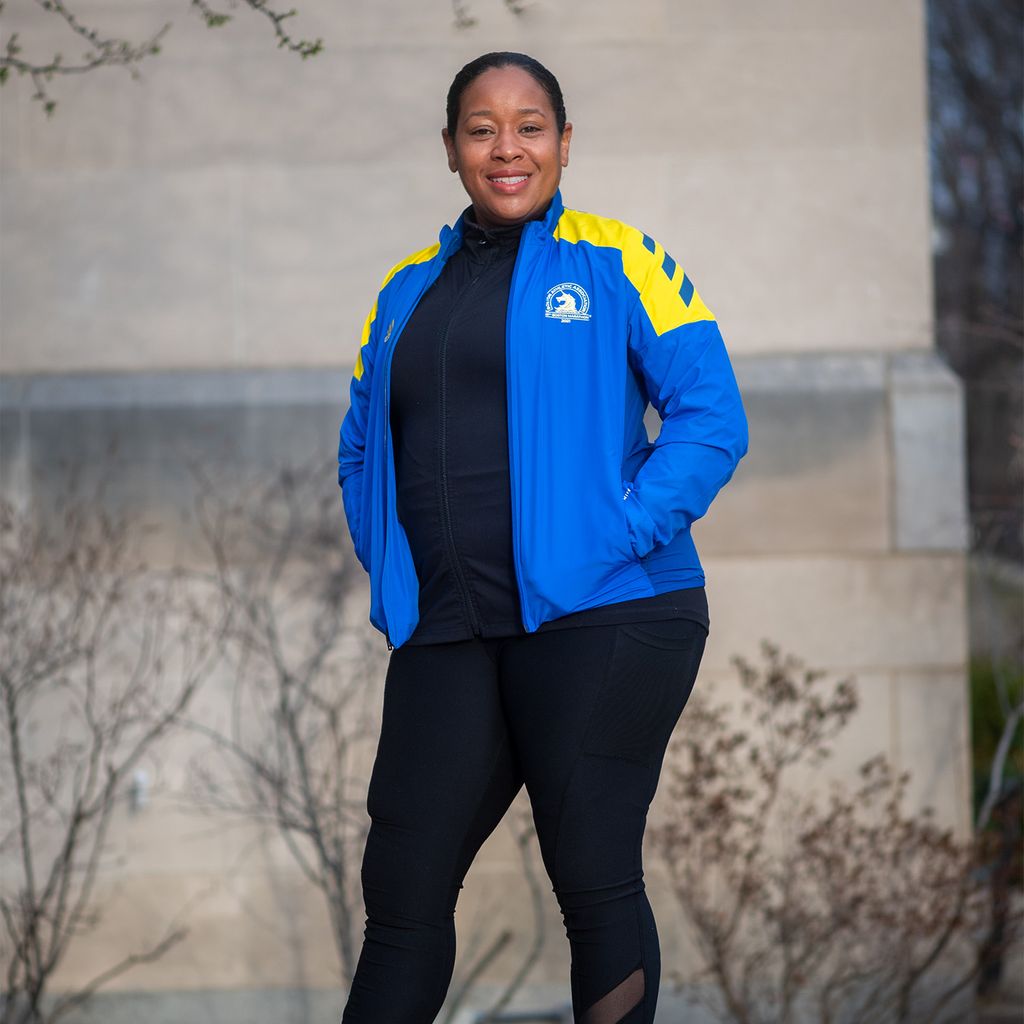
Olivia Clachar (MET’23), assistant director of Payment Services
Music plays a big role when Olivia Clachar runs.
“I cannot run without music. By the point where it’s a little grueling for me, I will absolutely sing. I cannot sing well, but I will sing anyway,” Clachar says with a laugh.
During one race last year, her headphones stopped working, so she took out her phone and played some music through its speaker as the race dragged on. By the end of it, she was surrounded by fellow runners who also needed a beat to keep them moving.
Clachar trains with the running group Black Girls Run, which strives to open up spaces in all sports to minority communities, where “there has not always been a space for us,” she says. Black Girls Run also stresses that runners start where they are: Clachar’s introduction to running began in 2021 when she started their “couch to 5K” program. “I would not consider myself a runner,” she says. “COVID was giving me cabin fever. I just needed to get out in the elements and be outdoors.”
Next, Clachar ran a 10K and a half-marathon, and then her Black Girls Run running mates persuaded her to join them to train for the virtual edition of the 125th Boston Marathon in October 2021.
“I talked it over with my family, and I did it,” Clachar says. “It was awesome. I had great support out there on the course, and it was so much fun.”
On a weekend before the 2022 Marathon, the group trained on Heartbreak Hill to learn the course. Clachar felt surprised at the atmosphere she found. Other runners encouraged her and her group, and the Fire Department had tables with water cups.
“The community itself has been so inviting,” she says. “I love going out on the course to not only be with my group, but others. There were tons of [groups] out there and everyone was saying hello and encouraging each other to keep going.”
Clachar found out about Trinity Boston Connects (TBC), the charity she’s running the Marathon to support, through Black Girls Run. The nonprofit was created to support the strong social justice work of Trinity Church and according to its website, aims to heal the traumatic impact of systemic racism in Boston.
TBC’s main program is called Sole Train, a running program that connects underprivileged students, known as Young Soles, with adult mentors, called Old Soles. Clachar wants the next generation to experience running’s physical, social, and emotional benefits, just as she has.
“All of these people are continuously supporting me,” she says. “My family is definitely supporting me. My mom, she’s like overjoyed that I’m doing this and she worries in the very same breath. She has all the recovery tools for me. And my children and husband have been awesome, as well. It’s been an amazing journey.”
Courtney Joly-Lowdermilk, BU Center for Psychiatric Rehabilitation associate director of strategic initiatives for College Mental Health Education Programs
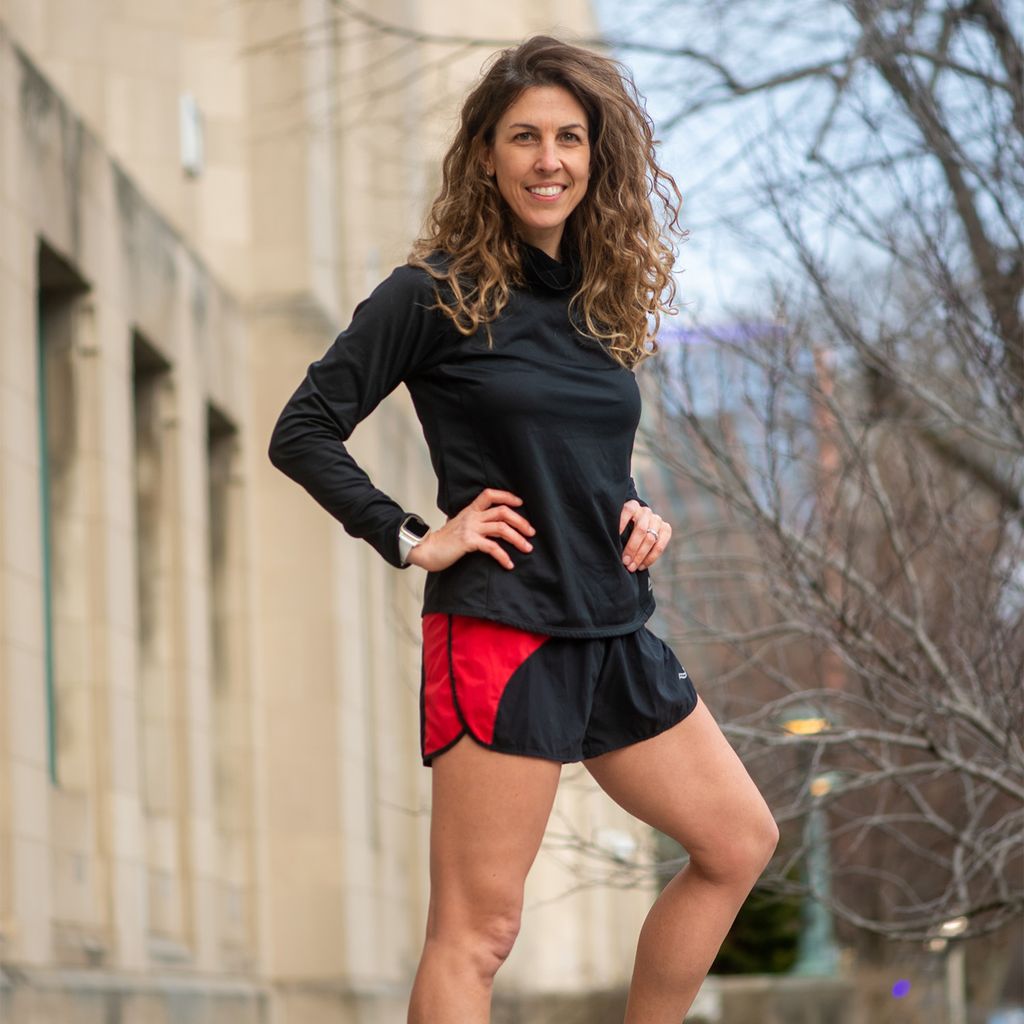
For years, Courtney Joly-Lowdermilk and her family cheered on the Boston Marathon runners on Patriots Day. Her perspective on the race changed in 2021.
“Last year, it hit me that maybe I could use my body to do some work, because there are so many charities you can run for,” says Joly-Lowdermilk, a University of Connecticut former rower.
In her job at BU’s Center for Psychiatric Rehabilitation, Joly-Lowdermilk creates systems to improve mental health on the BU campus and beyond. For example, her recent project, Flourishing Families, is a five-week support program for the families of students with mental health conditions.
While selecting a charity to fundraise for, Joly-Lowdermilk looked for one with a mission that spoke to her; she even thought about fundraising for the Center for Psychiatric Rehabilitation. She ultimately chose Trinity Boston Connects (like fellow Terrier Olivia Clachar), which she views as an extension of her job.
“TBC’s work with the mentorship programs are vehicles for change, all grounded in the values of personhood and racial justice,” she says. “For me, running for this nonprofit organization means standing in solidarity to uphold those values.”
Joly-Lowdermilk says she feels honored to be an ambassador for TBC and appreciates how Sole Train—the program the money she raises will support—uses running to connect mentors with middle school students.
“There are so many touching relationships that happen [in Sole Train] when you think about what it means to be a listening, trusted adult to a young adult who might not have that,” she says.
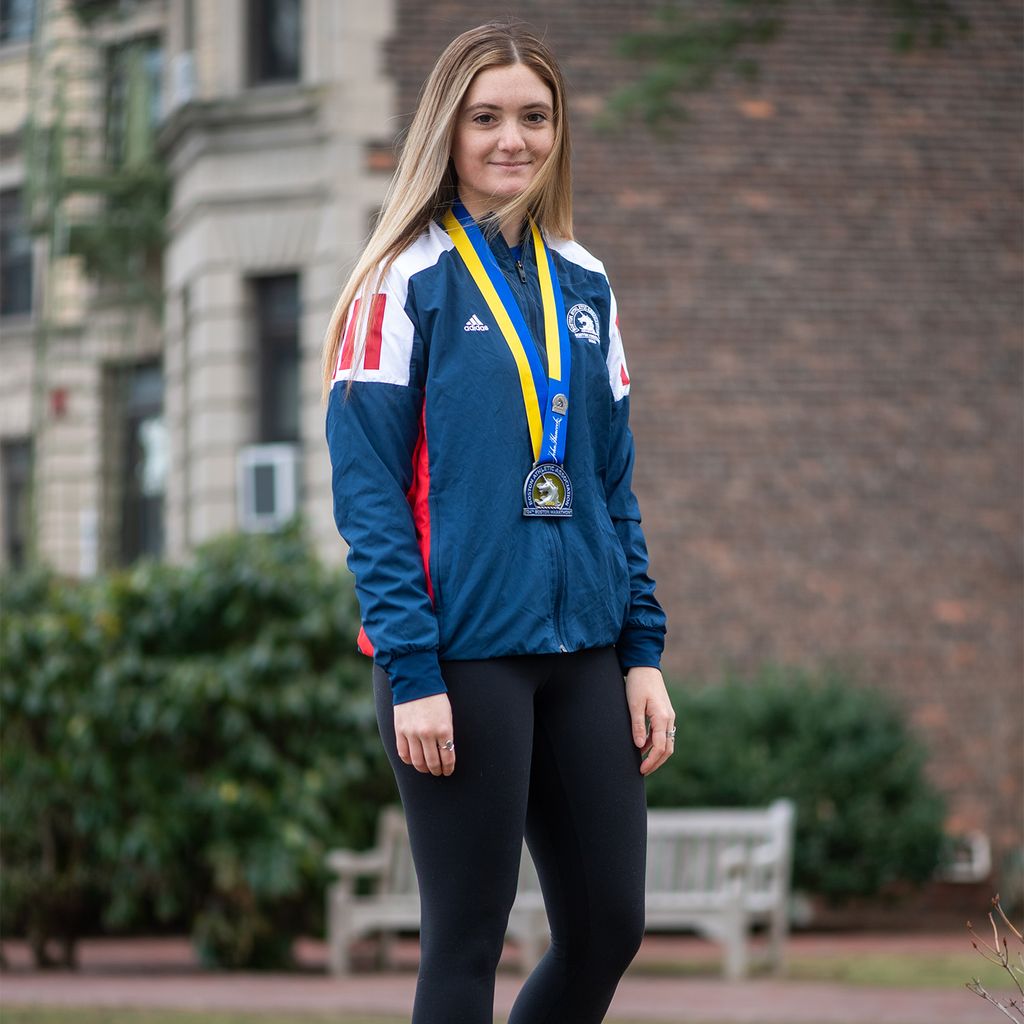
Cara Mooney (COM’22)
An in-person Boston Marathon has been three years in the making for Cara Mooney. She spent eight months training for the 2020 Boston Marathon, only to have the race turn virtual during that first year of COVID-19. She would have run in the in-person edition in fall 2021, but she was studying abroad in London.
While overseas, her biggest running endeavor was the Adidas City Runs Islington 1 Hour race in October 2021, where runners had one hour to run a one-mile course as many times as possible around the London Arsenal Football Club’s Emirates Stadium.
Her training consistency fell to the wayside because of studying abroad, the brutal New England winter, and her mindset that she would be too busy to run the Boston Marathon in the spring. Mooney says she couldn’t run more than six miles after returning from London, and she had only 12 weeks to train.
Then she found the BU Running Club and credits the group—and a weight lifting physical development program class through FitRec—with helping her return to marathon shape.
“Training has gone surprisingly really well,” she says. “I’m shocked that I haven’t got injured or had any setbacks whatsoever.”
Another reason this marathon is even more personal than her first is that she is raising money for her grandfather’s charity, the Mooney McIntyre Fund.
Her grandfather, Frank Mooney, is a Massachusetts track and field coaching legend. The fund raises money to support and buy new equipment for the Reggie Lewis Track and Athletic Center.
“He’s worked with the BAA for a long time. He has friends on the board, so this year, they wanted to reward him, in a way, so they gave his charity a bib,” Mooney says.
She knew the Marathon was 12 weeks out, so she asked her dad for advice. “He said, ‘If you can comfortably run a 10K, you should be able to train for a marathon in 12 weeks.’ If you were to tell me 11 weeks ago that I’d be able to run 26 miles nonstop…that’s a joke. So, it’s gone really well.”
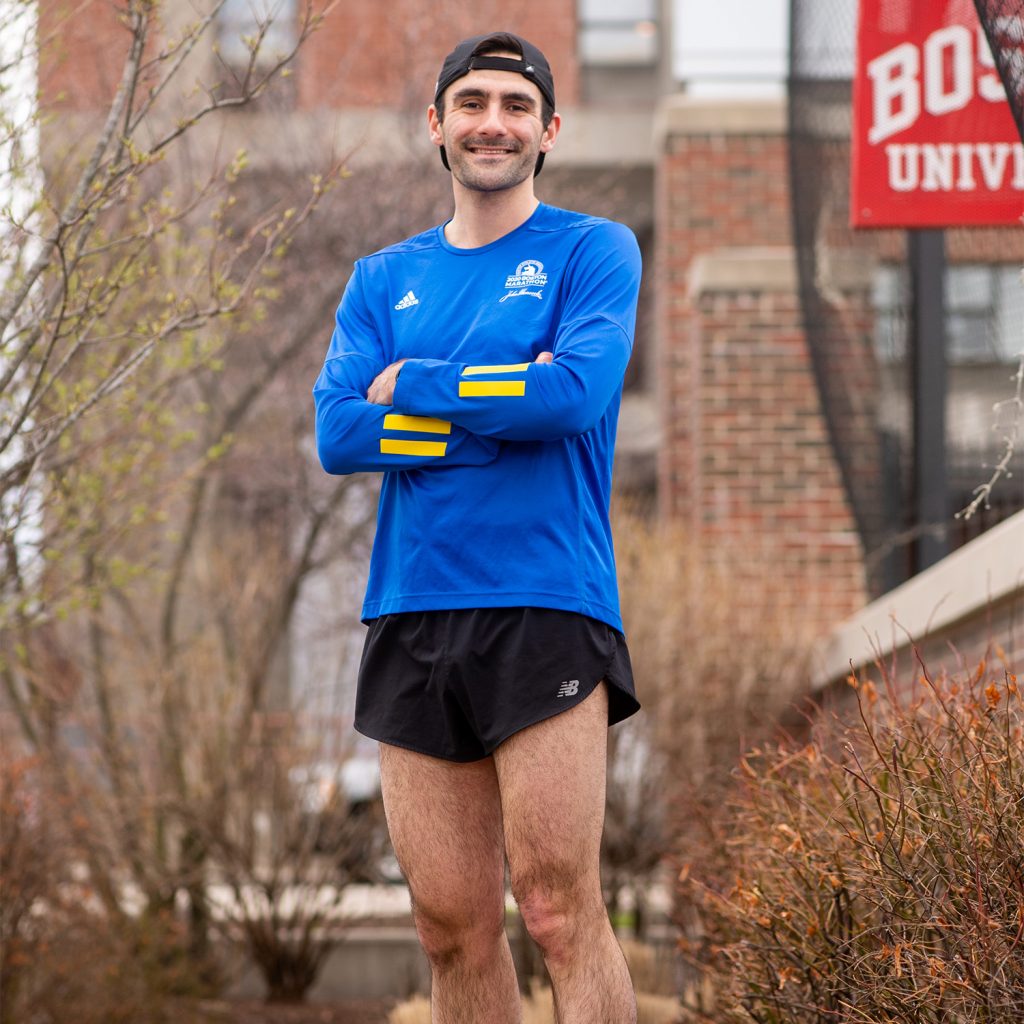
Ken Vinacco, Sargent Neurologic Physical Therapy Residency Program
Running has been a favorite hobby of Ken Vinacco’s for a long time—a former NCAA Division II runner at Stonehill College, Vinacco moved to Boston in the fall to begin a postgraduate residency program at BU.
Running has now taken on a greater purpose. He is raising money for the National Multiple Sclerosis Society’s Finish MS initiative. His mother was diagnosed with MS in 2005.
“I’m very passionate about helping people with MS because of my mother,” Vinacco says. “It’s sort of the reason why I chose to specialize in neurologic physical therapy. It was an easy decision to try and give them some money.”
In the 17 years since her diagnosis, Vinacco’s mother’s needs have increased. The family—Ken, his brother, and his father—first noticed her tripping more often than usual. The disease made her eventually start using a cane, and now a wheelchair.
“Typically moms, they’re very involved and able to help you out,” Vinacco says. “She’s always been there for me, she’s always there for me still, but she just doesn’t have the capacity to do some of the things that your typical mom would do for you.”
To train for the marathon, Vinacco worked with Battle Road Track Club, which he says helped motivate him to run in the winter months.
“They’re a bunch of post-collegiate runners like myself,” he says. “They take it pretty seriously, which is fantastic.”
This will be Vinacco’s fifth marathon—he ran the Newport Marathon twice, the virtual Boston Marathon once, and ran marathons on back-to-back days in a race across Rhode Island, where he raised money for a local charity called the MS Dream Center.
“In previous marathons, I’d just been training by myself and creating my own plan, and that’s what’s been different about this experience: I have a coach through the track club who helped me in creating a plan,” he says. “It’s a little bit more robust and really an intense program, so I feel that this is some of the best training I’ve been doing for a marathon, so [I have] high expectations for myself going into it because of that.”
The 126th Boston Marathon begins at 9:02 am in Hopkinton, Mass., on Monday, April 18, 2022. The men’s wheelchair division will start the race, and the fourth and final wave of runners for charity will start at 11:15 am. Prime viewing spots on and near campus are on Beacon Street and in Kenmore Square.

Comments & Discussion
Boston University moderates comments to facilitate an informed, substantive, civil conversation. Abusive, profane, self-promotional, misleading, incoherent or off-topic comments will be rejected. Moderators are staffed during regular business hours (EST) and can only accept comments written in English. Statistics or facts must include a citation or a link to the citation.